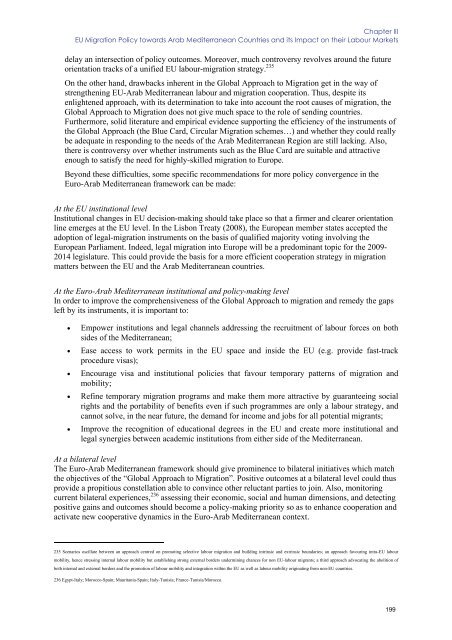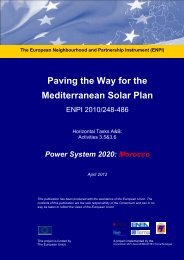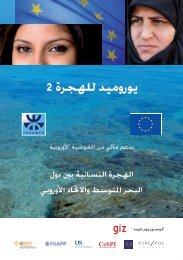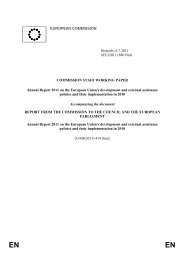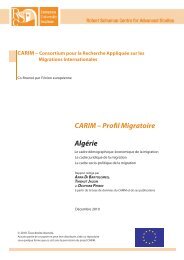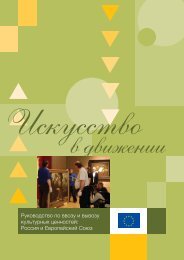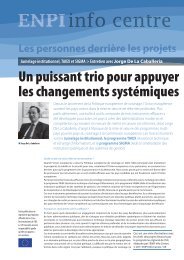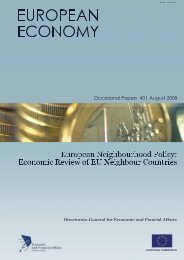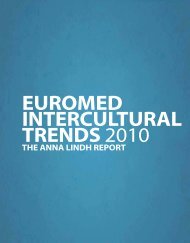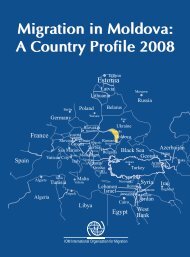Labour market performance and migration flows - European ...
Labour market performance and migration flows - European ...
Labour market performance and migration flows - European ...
You also want an ePaper? Increase the reach of your titles
YUMPU automatically turns print PDFs into web optimized ePapers that Google loves.
Chapter IIIEU Migration Policy towards Arab Mediterranean Countries <strong>and</strong> its Impact on their <strong>Labour</strong> Marketsdelay an intersection of policy outcomes. Moreover, much controversy revolves around the futureorientation tracks of a unified EU labour-<strong>migration</strong> strategy. 235On the other h<strong>and</strong>, drawbacks inherent in the Global Approach to Migration get in the way ofstrengthening EU-Arab Mediterranean labour <strong>and</strong> <strong>migration</strong> cooperation. Thus, despite itsenlightened approach, with its determination to take into account the root causes of <strong>migration</strong>, theGlobal Approach to Migration does not give much space to the role of sending countries.Furthermore, solid literature <strong>and</strong> empirical evidence supporting the efficiency of the instruments ofthe Global Approach (the Blue Card, Circular Migration schemes…) <strong>and</strong> whether they could reallybe adequate in responding to the needs of the Arab Mediterranean Region are still lacking. Also,there is controversy over whether instruments such as the Blue Card are suitable <strong>and</strong> attractiveenough to satisfy the need for highly-skilled <strong>migration</strong> to Europe.Beyond these difficulties, some specific recommendations for more policy convergence in theEuro-Arab Mediterranean framework can be made:At the EU institutional levelInstitutional changes in EU decision-making should take place so that a firmer <strong>and</strong> clearer orientationline emerges at the EU level. In the Lisbon Treaty (2008), the <strong>European</strong> member states accepted theadoption of legal-<strong>migration</strong> instruments on the basis of qualified majority voting involving the<strong>European</strong> Parliament. Indeed, legal <strong>migration</strong> into Europe will be a predominant topic for the 2009-2014 legislature. This could provide the basis for a more efficient cooperation strategy in <strong>migration</strong>matters between the EU <strong>and</strong> the Arab Mediterranean countries.At the Euro-Arab Mediterranean institutional <strong>and</strong> policy-making levelIn order to improve the comprehensiveness of the Global Approach to <strong>migration</strong> <strong>and</strong> remedy the gapsleft by its instruments, it is important to:Empower institutions <strong>and</strong> legal channels addressing the recruitment of labour forces on bothsides of the Mediterranean;Ease access to work permits in the EU space <strong>and</strong> inside the EU (e.g. provide fast-trackprocedure visas);Encourage visa <strong>and</strong> institutional policies that favour temporary patterns of <strong>migration</strong> <strong>and</strong>mobility;Refine temporary <strong>migration</strong> programs <strong>and</strong> make them more attractive by guaranteeing socialrights <strong>and</strong> the portability of benefits even if such programmes are only a labour strategy, <strong>and</strong>cannot solve, in the near future, the dem<strong>and</strong> for income <strong>and</strong> jobs for all potential migrants;Improve the recognition of educational degrees in the EU <strong>and</strong> create more institutional <strong>and</strong>legal synergies between academic institutions from either side of the Mediterranean.At a bilateral levelThe Euro-Arab Mediterranean framework should give prominence to bilateral initiatives which matchthe objectives of the “Global Approach to Migration”. Positive outcomes at a bilateral level could thusprovide a propitious constellation able to convince other reluctant parties to join. Also, monitoringcurrent bilateral experiences, 236 assessing their economic, social <strong>and</strong> human dimensions, <strong>and</strong> detectingpositive gains <strong>and</strong> outcomes should become a policy-making priority so as to enhance cooperation <strong>and</strong>activate new cooperative dynamics in the Euro-Arab Mediterranean context.235 Scenarios oscillate between an approach centred on promoting selective labour <strong>migration</strong> <strong>and</strong> building intrinsic <strong>and</strong> extrinsic boundaries; an approach favouring intra-EU labourmobility, hence stressing internal labour mobility but establishing strong external borders undermining chances for non EU-labour migrants; a third approach advocating the abolition ofboth internal <strong>and</strong> external borders <strong>and</strong> the promotion of labour mobility <strong>and</strong> integration within the EU as well as labour mobility originating from non-EU countries.236 Egypt-Italy; Morocco-Spain; Mauritania-Spain; Italy-Tunisia; France-Tunisia/Morocco.199


